Roberts A.D. The Cambridge History of Africa, Volume 7: from 1905 to 1940
Подождите немного. Документ загружается.

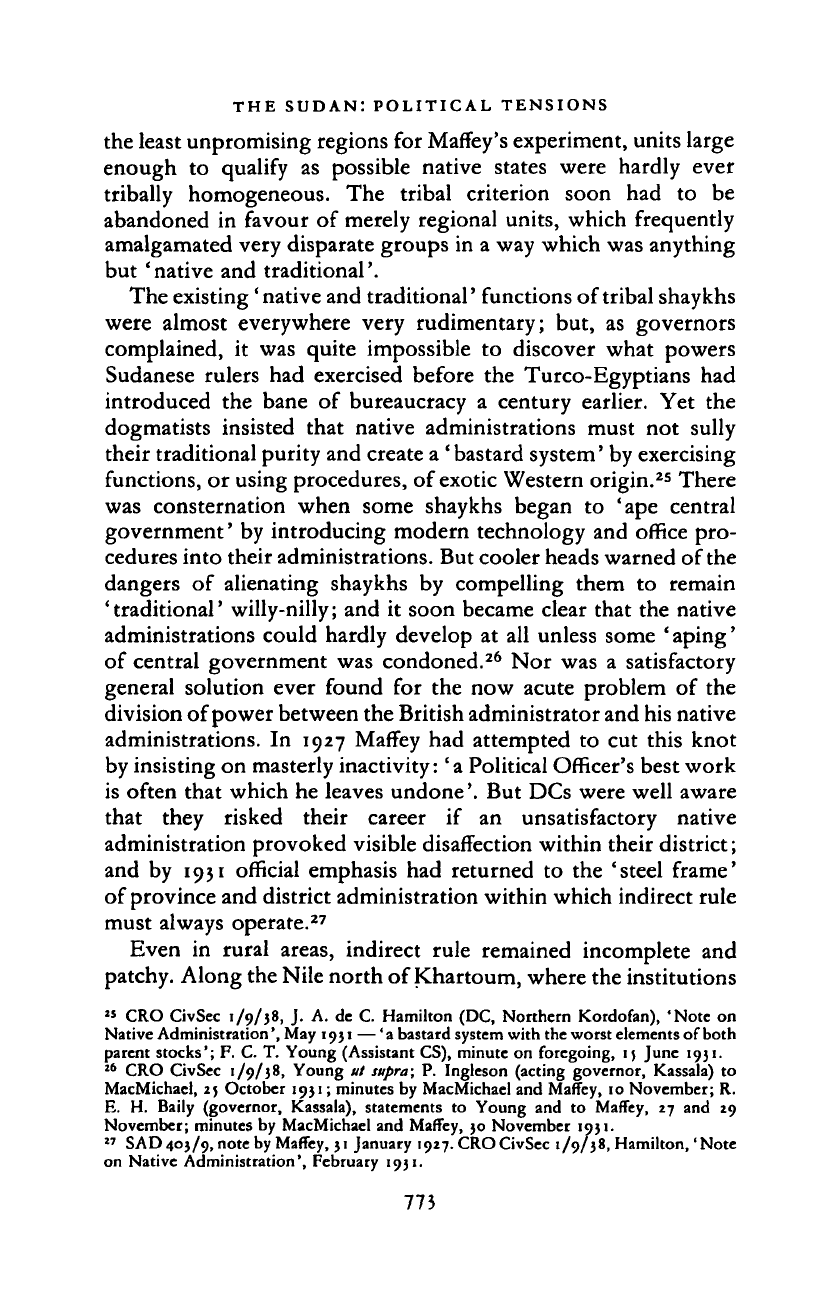
THE SUDAN: POLITICAL TENSIONS
the least unpromising regions for Maffey's experiment, units large
enough
to
qualify
as
possible native states were hardly ever
tribally homogeneous.
The
tribal criterion soon
had to be
abandoned
in
favour
of
merely regional units, which frequently
amalgamated very disparate groups in
a
way which was anything
but 'native and traditional'.
The existing' native and traditional' functions of tribal shaykhs
were almost everywhere very rudimentary;
but, as
governors
complained,
it was
quite impossible
to
discover what powers
Sudanese rulers
had
exercised before
the
Turco-Egyptians
had
introduced
the
bane
of
bureaucracy
a
century earlier.
Yet the
dogmatists insisted that native administrations must
not
sully
their traditional purity and create a ' bastard system' by exercising
functions,
or
using procedures, of exotic Western origin.
2S
There
was consternation when some shaykhs began
to 'ape
central
government'
by
introducing modern technology and office pro-
cedures into their administrations. But cooler heads warned of the
dangers
of
alienating shaykhs
by
compelling them
to
remain
'traditional' willy-nilly; and
it
soon became clear that the native
administrations could hardly develop
at all
unless some 'aping'
of central government was condoned.
26
Nor
was
a
satisfactory
general solution ever found
for the now
acute problem
of the
division of power between the British administrator and his native
administrations.
In
1927 Maffey
had
attempted
to cut
this knot
by insisting on masterly inactivity:'
a
Political Officer's best work
is often that which he leaves undone'. But DCs were well aware
that they risked their career
if an
unsatisfactory native
administration provoked visible disaffection within their district;
and
by
1931 official emphasis
had
returned
to the
'steel frame'
of province and district administration within which indirect rule
must always operate.
27
Even
in
rural areas, indirect rule remained incomplete
and
patchy. Along the Nile north of Khartoum, where the institutions
« CRO CivSec 1/9/38,
J. A. de C.
Hamilton (DC, Northern Kordofan), 'Note
on
Native Administration', May 19)
1
— 'a bastard system with the worst elements of both
parent stocks';
F.
C.
T.
Young (Assistant CS), minute on foregoing, 15 June 1951.
16
CRO CivSec 1/9/38, Young
ut
supra;
P.
Ingleson (acting governor, Kassala)
to
MacMichael, 25 October 1931; minutes by MacMichael and Maffey, 10 November;
R.
E.
H.
Baily (governor, Kassala), statements
to
Young
and to
Maffey,
27 and 29
November; minutes by MacMichael and Maffey, 50 November 1931.
" SAD403/9, note by Maffey, 31 January 1927. CRO CivSec 1/9/38, Hamilton,'Note
on Native Administration', February 1931.
773
Cambridge Histories Online © Cambridge University Press, 2008
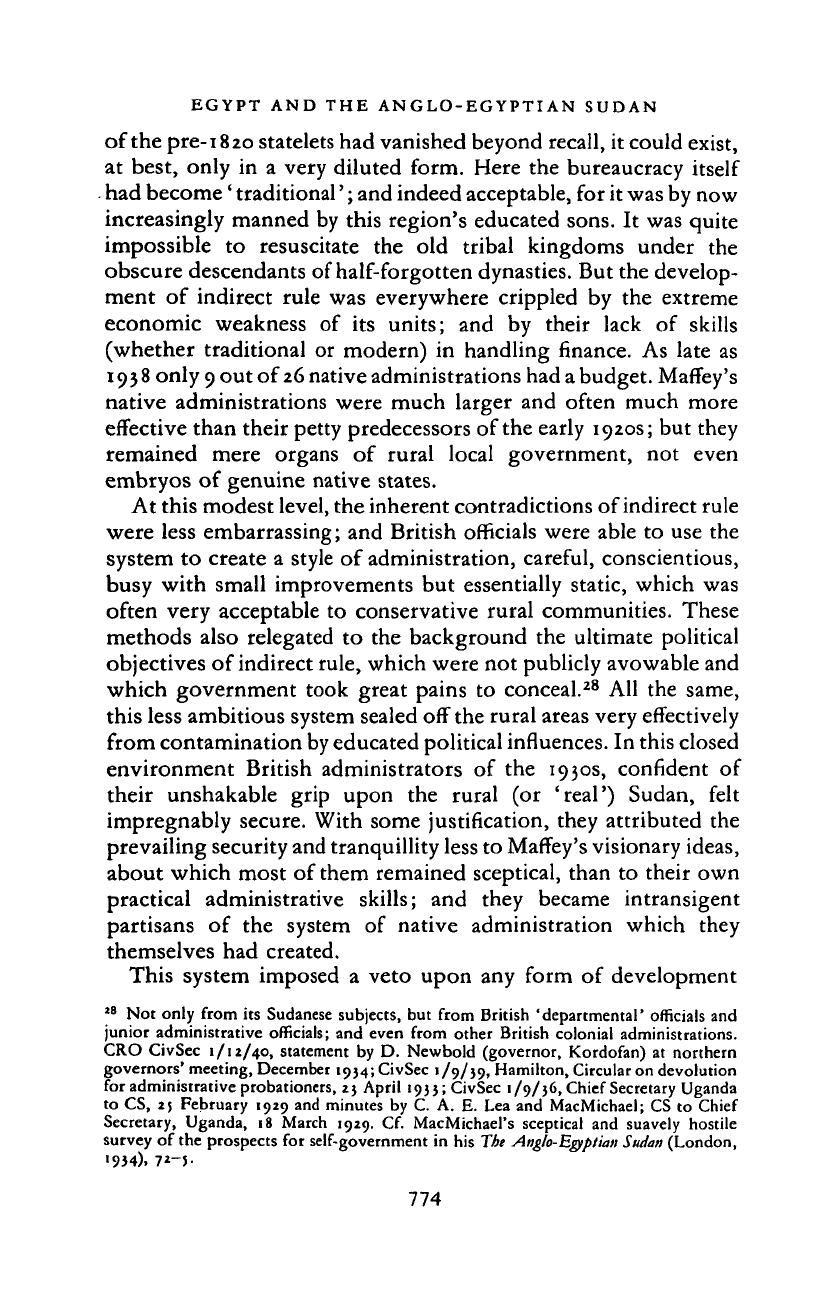
EGYPT AND THE ANGLO-EGYPTIAN SUDAN
of the pre-i
820
statelets had vanished beyond recall, it could exist,
at best, only in
a
very diluted form. Here the bureaucracy itself
had become' traditional'; and indeed acceptable, for it was by now
increasingly manned by this region's educated sons.
It
was quite
impossible
to
resuscitate
the old
tribal kingdoms under
the
obscure descendants of half-forgotten dynasties. But the develop-
ment
of
indirect rule was everywhere crippled by the extreme
economic weakness
of its
units;
and by
their lack
of
skills
(whether traditional
or
modern)
in
handling finance. As late as
1938 only
9
out of
26
native administrations had
a
budget. Maffey's
native administrations were much larger and often much more
effective than their petty predecessors of the early 1920s; but they
remained mere organs
of
rural local government,
not
even
embryos of genuine native states.
At this modest level, the inherent contradictions of indirect rule
were less embarrassing; and British officials were able to use the
system to create a style of administration, careful, conscientious,
busy with small improvements but essentially static, which was
often very acceptable to conservative rural communities. These
methods also relegated to the background the ultimate political
objectives of indirect rule, which were not publicly avowable and
which government took great pains
to
conceal.
28
All the same,
this less ambitious system sealed off the rural areas very effectively
from contamination
by
educated political influences. In this closed
environment British administrators
of
the 1930s, confident
of
their unshakable grip upon
the
rural
(or
'real') Sudan, felt
impregnably secure. With some justification, they attributed the
prevailing security and tranquillity less to Maffey's visionary ideas,
about which most of them remained sceptical, than to their own
practical administrative skills;
and
they became intransigent
partisans
of
the system
of
native administration which they
themselves had created.
This system imposed
a
veto upon any form
of
development
28
Not only from its Sudanese subjects, but from British 'departmental' officials and
junior administrative officials; and even from other British colonial administrations.
CRO CivSec 1/12/40, statement by
D.
Newbold (governor, Kordofan)
at
northern
governors' meeting, December 1934; CivSec 1/9/39, Hamilton, Circular on devolution
for administrative probationers, 23 April 1933; CivSec 1/9/36, Chief Secretary Uganda
to CS, 25 February 1929 and minutes by C.
A. E.
Lea and MacMichael; CS
to
Chief
Secretary, Uganda,
18
March 1929.
Cf.
MacMichael's sceptical and suavely hostile
survey of the prospects for self-government in his The Anglo-Egyptian
Sudan
(London,
'954).
7*~5-
774
Cambridge Histories Online © Cambridge University Press, 2008
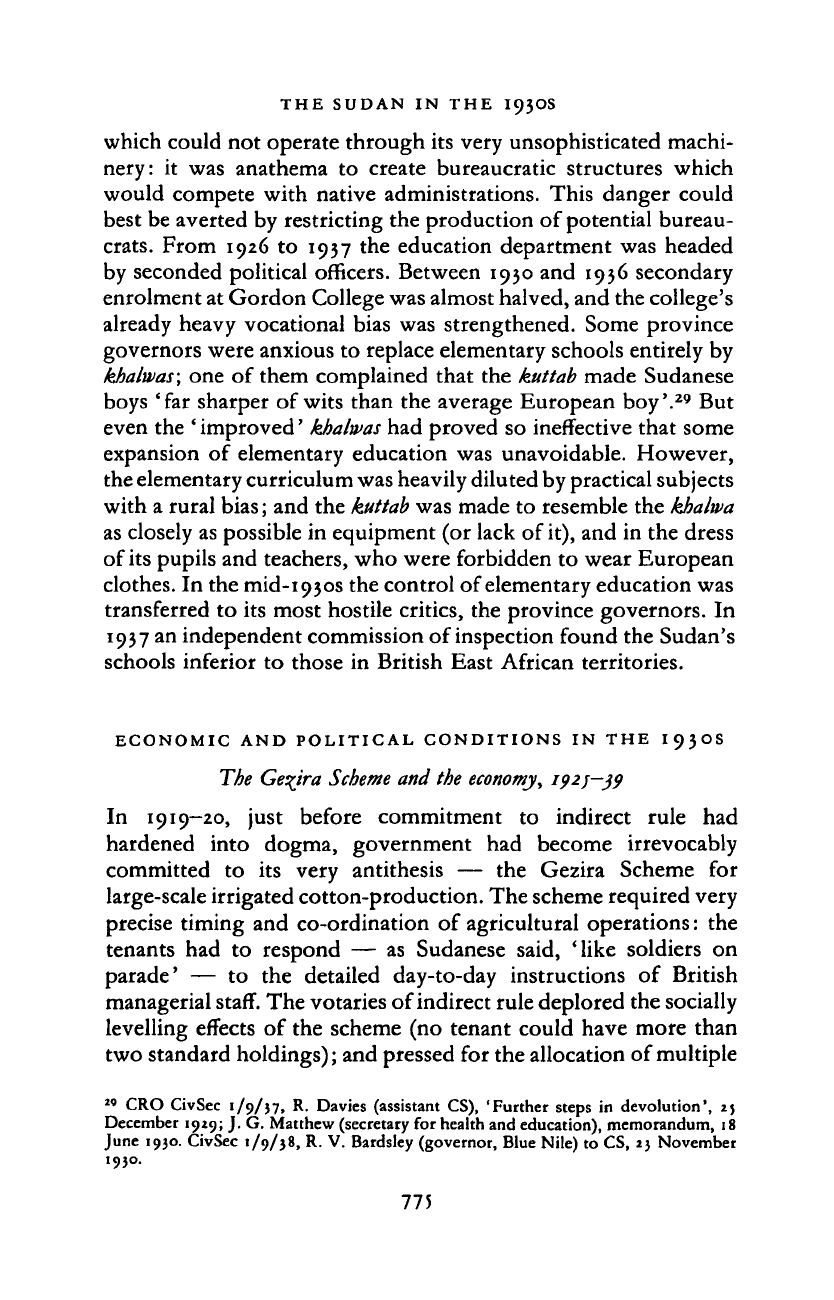
THE SUDAN IN THE 1930S
which could not operate through its very unsophisticated machi-
nery: it was anathema to create bureaucratic structures which
would compete with native administrations. This danger could
best be averted by restricting the production of potential bureau-
crats.
From 1926 to 1937 the education department was headed
by seconded political officers. Between 1930 and 1936 secondary
enrolment at Gordon College was almost halved, and the college's
already heavy vocational bias was strengthened. Some province
governors were anxious to replace elementary schools entirely by
khalwas;
one of them complained that the kuttab made Sudanese
boys 'far sharper of wits than the average European boy'.
29
But
even the ' improved'
khalwas
had proved so ineffective that some
expansion of elementary education was unavoidable. However,
the
elementary curriculum was heavily diluted by practical subjects
with a rural bias; and the kuttab was made to resemble the
khalwa
as closely as possible in equipment (or lack of
it),
and in the dress
of
its
pupils and teachers, who were forbidden to wear European
clothes. In the mid-i93os the control of elementary education was
transferred to its most hostile critics, the province governors. In
1937 an independent commission of inspection found the Sudan's
schools inferior to those in British East African territories.
ECONOMIC AND POLITICAL CONDITIONS IN THE 1930S
The Ge^ira Scheme and the economy, 1921—39
In 1919—20, just before commitment to indirect rule had
hardened into dogma, government had become irrevocably
committed to its very antithesis — the Gezira Scheme for
large-scale irrigated cotton-production. The scheme required very
precise timing and co-ordination of agricultural operations: the
tenants had to respond — as Sudanese said, 'like soldiers on
parade' — to the detailed day-to-day instructions of British
managerial
staff.
The votaries of indirect rule deplored the socially
levelling effects of the scheme (no tenant could have more than
two standard holdings); and pressed for the allocation of multiple
29
CRO CivSec 1/9/37, R. Davies (assistant CS), 'Further steps in devolution', zj
December 1929; J. G. Matthew (secretary for health and education), memorandum, 18
June 1930. CivSec 1/9/38, R. V. Bardsley (governor, Blue Nile) to CS, 23 November
1930.
775
Cambridge Histories Online © Cambridge University Press, 2008

EGYPT AND THE ANGLO-EGYPTIAN SUDAN
holdings
to
notables, who should be given supervisory powers
over lesser tenants. But the commercial syndicate that managed
the scheme successfully resisted these notions
as
economically
ruinous.
In
July 1925 the ^sennar Dam was completed,
and
between 1926 and 1931 the area under cultivation more than
doubled, to nearly 700,000 acres. Already by 1928 Gezira cotton
represented about
£2.5
m
of the Sudan's £6m of exports. Govern-
ment's 40 per cent of the Gezira proceeds usefully exceeded its
expenditure
on
water-supply
and
debt-service.
The
tenants,
formerly rain-cultivators, had improved their standard of living:
in addition to their own 40 per cent share, they were exempt from
direct taxation and self-sufficient
in
basic foodstuffs and animal
fodder. Some British officials, fanatics for the preservation of the
'traditional' Sudan, despised these merely economic benefits
as
'gross and materialistic'.
30
But no sane government could ignore
them.
In 1930 and 1931, however,
a
collapse
in
both the price and
yield
of
Gezira cotton dangerously aggravated
the
general
economic depression. In these two years the government's Gezira
losses totalled over £1.
5
m; and the monetary return to the tenants
shrank to zero. Only the fringe benefits, and the unfailing supply
of water, kept tenants on the scheme at all. Overall government
revenue shrank from nearly £jm in 1929 to £5.5m in 1932; the
1931 and 1932 budgets were balanced only by drawing £i.2m
from reserves. Exports collapsed from nearly £jtn
in
1929
to
under £2111
in
1931. Appeals
to
London
for
financial help, not
justified this time by the emergency of a half-completed dam, were
stonily rejected; instead, from 1931
to
1934
a
Treasury official
(H.
E. Fass) was seconded to Khartoum as financial secretary,
to
ensure that the Sudan did not default on
its
debt-service. The
revenue shortfall was met by the usual cuts and redundancies,
which this time hit British as well as Sudanese officials.
31
Imports
were halved (from £6m to £3111) between 1930 and 1932, mainly
it seems by the cessation in procurement of capital equipment for
Gezira extension. But ultimate disaster was inevitable if the Gezira
continued
to
generate enormous losses; and the gradual liquid-
30
A.
Gaitskell, Gezira:
a
story
of
development
in the
Sudan (London, 1959), 202, citing
W.
P. D.
Clarke (assistant financial secretary), memorandum, 16 January 1929.
31
The
reduction
in
initial salary
for
Gordon College 'graduates' entering
the
bureaucracy provoked
in
September 1931
a
brief student strike
—
the solitary instance
of overt opposition
by
the intelligentsia between 1924 and 1958.
776
Cambridge Histories Online © Cambridge University Press, 2008
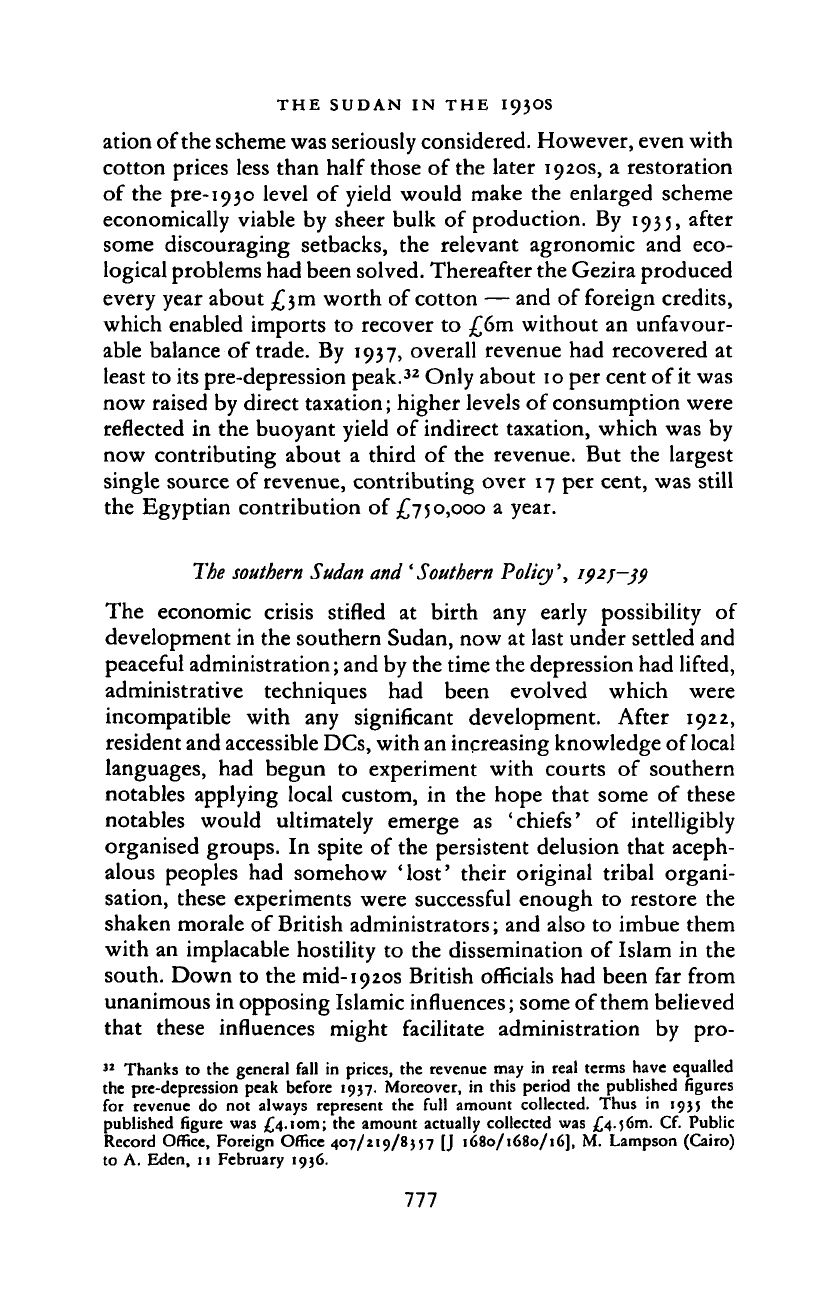
THE SUDAN IN THE I93OS
ation of the scheme was seriously considered. However, even with
cotton prices less than half those of the later 1920s, a restoration
of the pre-1930 level of yield would make the enlarged scheme
economically viable by sheer bulk of production. By 1935, after
some discouraging setbacks, the relevant agronomic and eco-
logical problems had been solved. Thereafter the Gezira produced
every year about £$m worth of cotton — and of foreign credits,
which enabled imports to recover to £6m without an unfavour-
able balance of trade. By 1937, overall revenue had recovered at
least to its pre-depression peak.
32
Only about
10
per cent of it was
now raised by direct taxation; higher levels of consumption were
reflected in the buoyant yield of indirect taxation, which was by
now contributing about a third of the revenue. But the largest
single source of revenue, contributing over 17 per cent, was still
the Egyptian contribution of £750,000 a year.
The
southern
Sudan and 'Southern Policy, 192/-59
The economic crisis stifled at birth any early possibility of
development in the southern Sudan, now at last under settled and
peaceful administration; and by the time the depression had lifted,
administrative techniques had been evolved which were
incompatible with any significant development. After 1922,
resident and accessible DCs, with an increasing knowledge of local
languages, had begun to experiment with courts of southern
notables applying local custom, in the hope that some of these
notables would ultimately emerge as 'chiefs' of intelligibly
organised groups. In spite of the persistent delusion that aceph-
alous peoples had somehow 'lost' their original tribal organi-
sation, these experiments were successful enough to restore the
shaken morale of British administrators; and also to imbue them
with an implacable hostility to the dissemination of Islam in the
south. Down to the mid-19 20s British officials had been far from
unanimous in opposing Islamic influences; some of them believed
that these influences might facilitate administration by pro-
32
Thanks to the general fall in prices, the revenue may in real terms have equalled
the pre-depression peak before 1937. Moreover, in this period the published figures
for revenue do not always represent the full amount collected. Thus in 193) the
published figure was £4.10m; the amount actually collected was £4.5
6m.
Cf. Public
Record Office, Foreign Office 407/219/8)57 [J 1680/1680/16], M. Lampson (Cairo)
to A. Eden, 11 February 1936.
777
Cambridge Histories Online © Cambridge University Press, 2008

EGYPT AND THE ANGLO-EGYPTIAN SUDAN
moting more ' civilised' and intelligible modes of socio-political
behaviour among Southern Sudanese. By the later 1920s, how-
ever,
all
Arab
and
Islamic influences were officially seen
as
corrosive solvents of the 'tribal discipline' that the administrators
were striving to create; and, after 1924, as potential vehicles of the
politically dangerous 'Northern Sudanese outlook'. These views
were increasingly shared by senior officials in Khartoum.
In 1927 Maffey discovered that the south could not give birth
even to 'traditional' native states without some educational and
economic development. He was dissatisfied with the progress of
southern education, which had been left entirely
to
missionary
enterprise and which government had only just begun, very
scantily, to subsidise. But the Political Service convinced Maffey
that a government system with northern Sudanese teachers would
be politically dangerous. Grants-in-aid to missions were therefore
considerably increased, and school enrolments rose from under
800 in 1926 to over 2,600 in 1930. In 1930, the entire Nuer people
were,
at
Maffey's insistence,
at
last brought under settled
administration after their final resistance had been crushed by
a
major military campaign. In the same year, government formally
resolved to isolate the south completely from all Arab and Islamic
influences; and, behind this barrier,
to
'build up self-contained
tribal units with structure and organisation based on indigenous
customs, traditions and beliefs'.
33
This policy implied the early
replacement
of
northern Sudanese officials and employees
by
non-Muslim, English-speaking southerners. The production
of
these officials would require the rapid development, as
a
'vital
feature of general policy',
34
of southern education.
Educational expansion duly took place until 1932.
It
then
ceased abruptly until the early 1940s. This was no mere side-effect
of the economic crisis. There was in fact little decline in the funds
allotted to southern education, and by 1935 the shortfall had been
more than restored; but whereas until 1931 the missions had been
encouraged
to
attempt comparatively 'advanced' instruction,
from 1932 they were in effect told to teach as little as possible and
to concentrate on 'character-training' by hard agricultural work.
Between 1932 and 1938 there was an actual decline in the number
33
CRO CivSec i.C.i., MacMichael, Circular
to
southern governors, 25 January 1930.
Printed
in
Muddathir 'Abd al-Rahim, Imperialism and nationalism, 244-9.
34
CRO CivSec i.C. 1., MacMichael
lit
supra, part
I,
sub-para A(b).
778
Cambridge Histories Online © Cambridge University Press, 2008

THE SUDAN IN THE 1930S
of literate southern employees. Education as a ' vital feature of
general policy' could be abandoned because governors and DCs
(most of whom had never much liked it) had developed techniques
of administration which made educated southerners not merely
superfluous but positively dangerous. Especially among Nilotics,
administration was not merely a matter of
DCs
giving orders and
'chiefs' carrying them out. Nilotics had abandoned resistance on
the tacit condition that administration should operate through
their own institutions. Peaceful administration depended upon
relations of confidence between DCs and the ritual or other
experts who were the custodians of these institutions. These
relations would have been disrupted by the intrusion of educated
southerners, often (so DCs said) ' drawn from families who have
no tribal or social status'.
35
Economic development was minimal. A little rain-grown
cotton was produced, usually under compulsion because the
prices offered were no incentive. When compulsion was aband-
oned, production usually collapsed. Of course, any significant
economic development would have threatened the objectives and
methods of 'Southern Policy' hardly less than educational
expansion or religious conversion — including conversion to
Christianity, which many DCs unofficially discouraged, while
government denied to converts any exemption from tribal custom
and 'discipline'. However, conversion was hardly yet a significant
factor: not until about 1940 could the missions begin to count
their flocks in thousands rather than hundreds.' Southern Policy',
in theory directed to gradual social evolution, 'building on
conditions as they exist',
36
in practice inhibited all evolution. It
accentuated ethnic exclusiveness and Nilotic ultra-conservatism.
It did not 'develop' tribal structures: it fossilised them. It soon
became no more than a technique for the maintenance of total
immobility; by the early 1940s even its staunchest supporters
could give no intelligible explanation of its ultimate objectives.
37
Its sole virtue — but not a negligible virtue in the southern Sudan
— was that it kept the peace with a minimal use of force.
35
CRO CivScc Baht al-Ghazal i/j/z8, handing-over notes
by DC
Yitrol District,
1935: cited
by
Sevier, 'Anglo-Egyptian Condominium
in the
Southern Sudan', 242.
36
CRO CivSec 17.A1/2,
A. G.
Hickson (resident inspector, Southern education)
at
the
19)3
Educational Conference.
37
'Solvitur ambulando' was the reply
of
Martin W. Parr (governor, Equatoria, 1936-42)
to
a DC
who pressed
the
question
in
1941: CRO CivSec Bahr al-Ghazal 1/1/1, Parr
to
G. L.
Elliott-Smith,
29
April 1941.
779
Cambridge Histories Online © Cambridge University Press, 2008
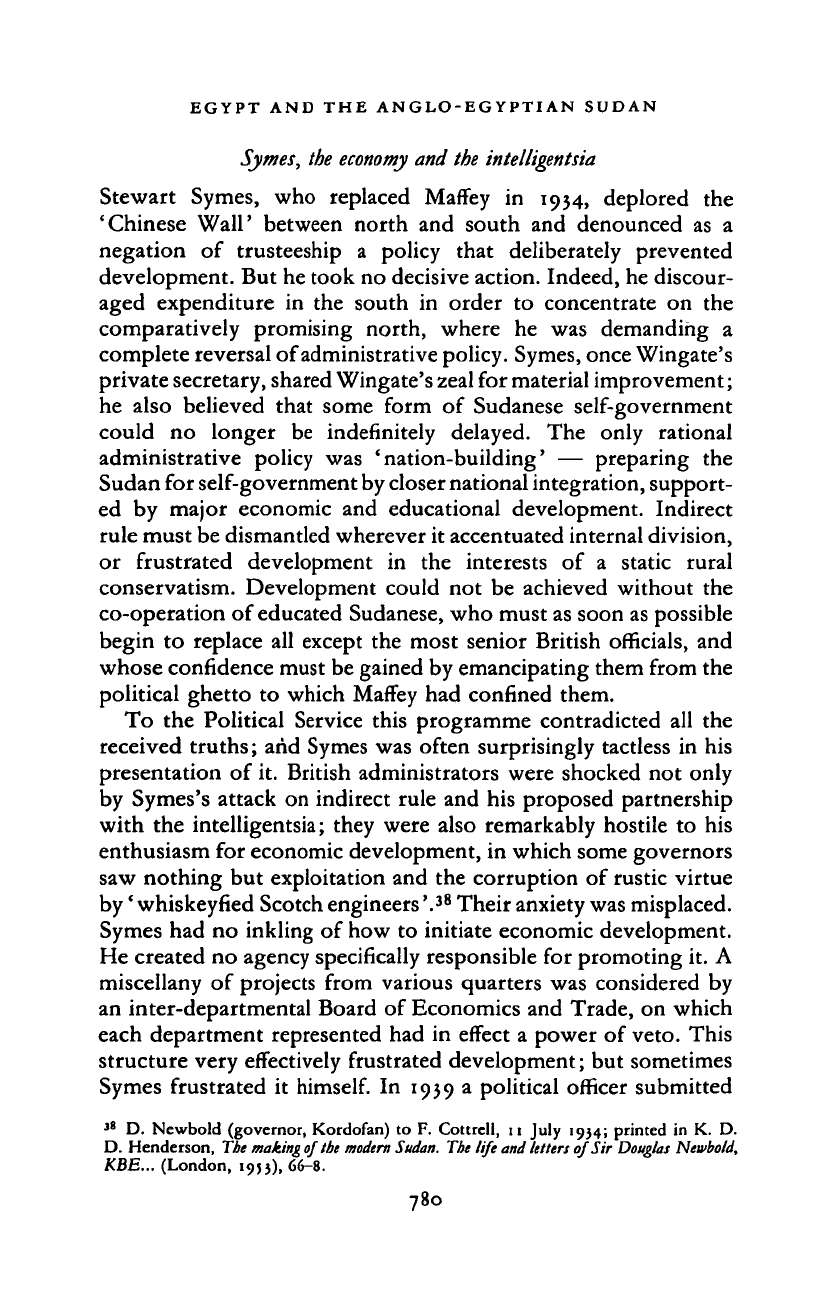
EGYPT AND THE ANGLO-EGYPTIAN SUDAN
Symes, the economy and the intelligentsia
Stewart Symes, who replaced Maffey in 1934, deplored the
'Chinese Wall' between north and south and denounced as a
negation of trusteeship a policy that deliberately prevented
development. But he took no decisive action. Indeed, he discour-
aged expenditure in the south in order to concentrate on the
comparatively promising north, where he was demanding a
complete reversal of administrative policy. Symes, once Wingate's
private secretary, shared Wingate's zeal for material improvement;
he also believed that some form of Sudanese self-government
could no longer be indefinitely delayed. The only rational
administrative policy was 'nation-building' — preparing the
Sudan for self-government by closer national integration, support-
ed by major economic and educational development. Indirect
rule must be dismantled wherever it accentuated internal division,
or frustrated development in the interests of a static rural
conservatism. Development could not be achieved without the
co-operation of educated Sudanese, who must as soon as possible
begin to replace all except the most senior British officials, and
whose confidence must be gained by emancipating them from the
political ghetto to which Maffey had confined them.
To the Political Service this programme contradicted all the
received truths; and Symes was often surprisingly tactless in his
presentation of it. British administrators were shocked not only
by Symes's attack on indirect rule and his proposed partnership
with the intelligentsia; they were also remarkably hostile to his
enthusiasm for economic development, in which some governors
saw nothing but exploitation and the corruption of rustic virtue
by' whiskeyfied Scotch engineers \
38
Their anxiety was misplaced.
Symes had no inkling of how to initiate economic development.
He created no agency specifically responsible for promoting it. A
miscellany of projects from various quarters was considered by
an inter-departmental Board of Economics and Trade, on which
each department represented had in effect a power of veto. This
structure very effectively frustrated development; but sometimes
Symes frustrated it
himself.
In 1939 a political officer submitted
18
D. Ncwbold (governor, Kordofan) to F. Cottrell, u July 1934; printed in K. D.
D.
Henderson, The making of the
modern
Sudan.
The life and letters of Sir Douglas Newbold,
KBE... (London, 1953), 66-8.
780
Cambridge Histories Online © Cambridge University Press, 2008

THE SUDAN IN THE I93OS
a thoughtful and lucid proposal for
a
modest degree of import-
substitution by state-sponsored and tariff-protected textile manu-
facture. Symes, all too well coached by his financial secretary F.
Rugman (1934-44), forbade discussion of this paper as
a
'quack
solution based
on
false economics' contrary
to the
principles
established by Adam Smith.
39
Meanwhile Rugman,
a
cautiously
defensive financier ideologically opposed
to
'socialistic' state
enterprise, invested the government's considerable surpluses
in
London.
40
In the administrative and educational spheres Symes was a little,
but not much, more successful than in economic policy.
In
1937
he
put through, against considerable opposition, local government
ordinances which
in
principle abolished
the
status
of
native
administration as
'a
thing apart' and brought
it
into
a
structure
common to the entire northern Sudan. But the governors simply
refused to accept Symes's proposed legal reforms, which would
have extended the competence of the legal codes and the profes-
sional judiciary
at
the expense
of
the judicial powers both
of
shaykhs and of administrative officials. Nor did Symes achieve any
genuine ' substitution' of Sudanese for British officials, in spite of
complaints that
he
was creating
an
'Anglo-Sudanese' Political
Service and 'swamping' the native administrations with hordes
of Sudanese bureaucrats. The figures for
'
Division
I'
officials tell
their own-story:
41
between 1935 and 1939 the number of British
officials rose from
441
to 553, while that of Sudanese officials rose
from
6 to
28. Genuine Sudanisation was
of
course impossible
without major educational improvement. This too Symes hardly
achieved; but he did get education moving again after its long
stagnation. Secondary enrolment
at
Gordon College rose from
under 300 in 1936 to over 500 in 1940. In 1936 the College began
to shed its vocational courses, and in 1938 boys were successfully
entered for the Cambridge School Certificate.
In
1939-40, under
a
director of education, Christopher Cox, who was an Oxford don,
»
CRO
CivSec 1/5/11,
M. W.
Parr
to A. J.
Gillan
(CS),
1
j
February 1939, enclosing
memorandum
by P. J.
Sandison,
10
February; comments
by
financial secretary's office
(J.
W. E.
Miller),
7
March; minute
by
Gillan,
n
March; 'Minutes
of a
meeting
at the
Palace',
14
March
1939,
citing Symes's introductory remarks.
40
In
1937
income from investments
was
£221,000,
or
nearly
5
per
cent
of
revenue.
In
1939,
after paying
off
£}in of
the
1919-21
J.J per
cent Gezira loan
(and in
effect
converting another
£im
to
a
loan
at 3.25 per
cent), Rugman still
had
nearly
£6m
in
reserve.
41
Bakheit, 'British administration
and
Sudanese nationalism', 249-54,
261.
781
Cambridge Histories Online © Cambridge University Press, 2008
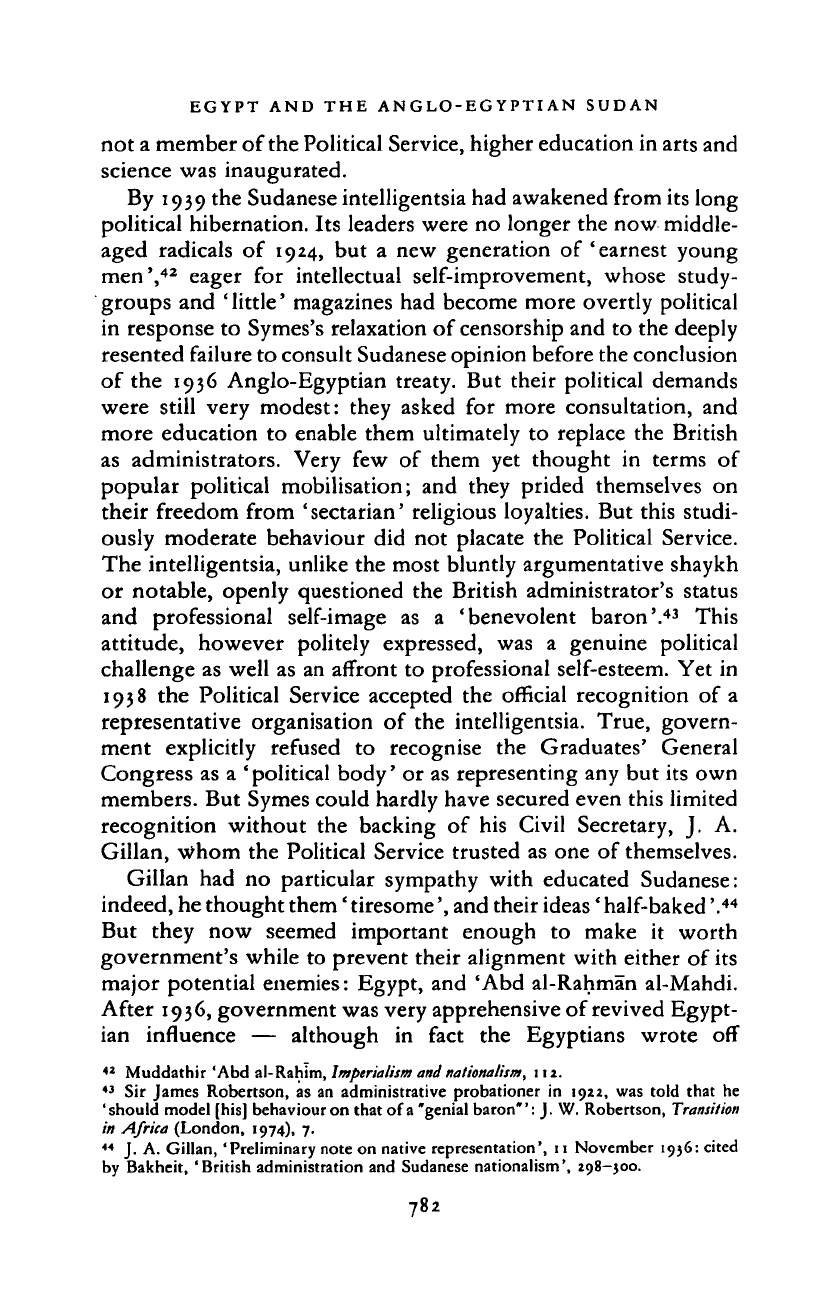
EGYPT AND THE ANGLO-EGYPTIAN SUDAN
not a member of the Political Service, higher education in arts and
science was inaugurated.
By 1939 the Sudanese intelligentsia had awakened from its long
political hibernation. Its leaders were no longer the now middle-
aged radicals of 1924, but a new generation of 'earnest young
men',
42
eager for intellectual self-improvement, whose study-
groups and 'little' magazines had become more overtly political
in response to Symes's relaxation of censorship and to the deeply
resented failure to consult Sudanese opinion before the conclusion
of the 1936 Anglo-Egyptian treaty. But their political demands
were still very modest: they asked for more consultation, and
more education to enable them ultimately to replace the British
as administrators. Very few of them yet thought in terms of
popular political mobilisation; and they prided themselves on
their freedom from 'sectarian' religious loyalties. But this studi-
ously moderate behaviour did not placate the Political Service.
The intelligentsia, unlike the most bluntly argumentative shaykh
or notable, openly questioned the British administrator's status
and professional self-image as a 'benevolent baron'.
43
This
attitude, however politely expressed, was a genuine political
challenge as well as an affront to professional self-esteem. Yet in
1938 the Political Service accepted the official recognition of a
representative organisation of the intelligentsia. True, govern-
ment explicitly refused to recognise the Graduates' General
Congress as a 'political body' or as representing any but its own
members. But Symes could hardly have secured even this limited
recognition without the backing of his Civil Secretary, J. A.
Gillan, whom the Political Service trusted as one of themselves.
Gillan had no particular sympathy with educated Sudanese:
indeed, he thought them' tiresome', and their ideas' half-baked \
44
But they now seemed important enough to make it worth
government's while to prevent their alignment with either of its
major potential enemies: Egypt, and 'Abd al-Rahman al-Mahdi.
After 1936, government was very apprehensive of revived Egypt-
ian influence — although in fact the Egyptians wrote off
4J
Muddathir 'Abd al-Rahim, Imperialism and nationalism,
112.
43
Sir
James Robertson,
as an
administrative probationer
in
1922,
was
told that
he
' should model [his] behaviour on that of a "genial baron"':
J.
W. Robertson, Transition
in Africa (London, 1974),
7.
44
J. A.
Gillan, 'Preliminary note
on
native representation',
11
November 19)6: cited
by Bakheit, 'British administration and Sudanese nationalism', 298-300.
782
Cambridge Histories Online © Cambridge University Press, 2008
